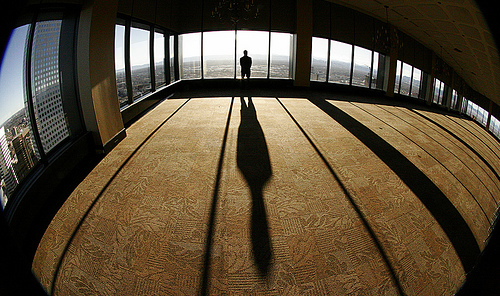Elayne Clift

Photo: zenobia_joy
Ever since my first job as a medical secretary, I have believed it would be useful for med students to be admitted anonymously to a teaching hospital where they could experience first-hand the indignities of a medical work-up. Whether for diagnostic or treatment purposes, I’m sure their empathy for patients would ratchet up considerably if they too were made to undress, have every orifice of their body invaded, be poked and prodded, and have to wear those demeaning johnnies.
Granted, doctor-patient relations have changed since I first got this idea but I think it’s relevant. I’d still like to know how the medical elite would react if a bunch of students, interns, residents and house staff stood around their beds and talked about them as if they were infantile or absent.
How would psychiatrists like relinquishing their power altogether while living by the rigid rules of a psych unit? Would they rebel at being forced to accept forms of therapy they found irrelevant, distasteful or frightening? Of course, it’s not so easy to suggest that surgeons should be operated upon or that dentists should be subjected to root canal. And there’s no way we could ever push male obstetricians to the limits of labor. But you get my drift.
Now there’s another group of folks who I think could benefit by experiencing the reality of those with whom they only come in contact on a needs basis. I’m thinking here of CEOs, Wall Street bankers and the like; you know, the fellows who think that giving up a private jet or two is altruism in the face of national crisis.
I’d like to see these guys — the ones who live not only in gated-community mansions but on another planet – see what it’s like to get by on, say, $40,000 a year. Better yet, I’d like to make them do what Barbara Ehrenreich did in order to write her bestseller, Nickeled and Dimed. She went underground as a minimum-wage worker, you will recall, to explore what life was like on the margins. For months she lived in motels, ate junk food, and worked like a dog for a pittance, so exhausted by week’s end that she had to sneak away periodically to process what she’d been experiencing. The bloated bank boys and their ilk wouldn’t last a day. (For a start, they’d have to fix their own meals, clean up after themselves and drive their own cars.)
Watching the testimony of the Darien to Wall Street fraternity being grilled by Congress during hearings about the infamous, invisible bailout it was clear that many of them still didn’t get it. If they did, incredibly, they still thought they were entitled to the perks of the powerful: bonuses, Las Vegas weekends, golden handshakes at the very least. What were they thinking?
Forget Motel 6 and a job at K-Mart. These jokers should be exiled and made to run around in loincloths while picking fruit from a tree. I’d settle for having them return their buyouts, sell off some of their assets and establish food banks and homeless shelters.
Not likely. But at least some of them are duly shamed. A few understand that the rest of us mere mortals are so fed up and hold them in such contempt that they will never again be as powerful as they once were. They know that every day from now on when they look in the mirror to shave they will be facing the image of someone they’d be ashamed to tell their kids about. There is, at least, that.
And the idea that, metaphorically speaking, they are now (or soon will be) the ones in the johnnies (the great equalizer), stripped of their finery, tethered to a lifeline, fearful, undignified, exposed. It’s almost enough to warm the cockles of Barbara Ehrenreich’s heart – and mine – as we think about all those people on the factory floors who will soon be joining the ever-growing unemployment line.











No comments so far ↓
Nobody has commented yet. Be the first!
Comment